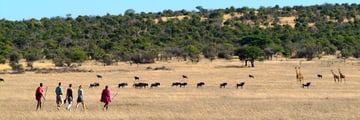Kenya and Porini Camps Environmental and Sustainable Tourism
Kenya as a country has very much tried to embrace sustainable tourism.
National Parks, areas set aside for the preservation of wildlife and to protect biodiversity, commenced being set up as long ago as the 1940s. It was recognised that humans were encroaching on wildlife space through farming - particularly cattle grazing - at an alarming rate, causing increasing human and wildlife conflict resulting in rapidly declining wildlife populations.
National Parks now cover 8% of Kenya’s land mass.
Single use plastics were banned in 2020 after a plastic bag ban in 2018, leading the globe in the fight against plastic pollution.
Porini Camps & Safari Holidays
A great example of sustainability is demonstrated with many of our Kenya safari providers, very specifically those situated within conservancies. Kenya tourism has been one of the nations at the forefront of sustainability for many years now and a good example to others.
To arrive in Kenya our customers need to take a flight, clearly causing carbon emissions into the environment. We all know human carbon emission is a major contributor towards climate change – so it is therefore a negative in travelling anywhere, including to Kenya.
However, with organisations such as Porini, the balance of social, economic and environmental good that is created from responsible tourism hugely offsets and arguably outweighs the negatives of getting there.
Tourism accounts for around 20% of GDP. This allows for substantial levels of employment and investment in the preservation of ecosystems and wildlife. Without this, the Kenya Government would not be able to afford to preserve and set aside 8% of its lands for wildlife, and the effect of this stopping would be catastrophic for much of Africa’s wildlife.
Employment growth has been most substantial within the wildlife areas providing local jobs. This helps basic economics and conservation to work hand in hand as ecosystems are preserved and expanded with wildlife protection, instead of previous trends of increased farming and shrinking of wildlife areas with increased animal-human conflicts.
Porini was one of the pioneering organisations to work with local communities and set up community-based conservancies, with their first more than 30 years ago. These are now widely heralded a massive success as they have completely involved and engaged local communities.
Conservancies have been developed, alongside the national parks, to expand the eco systems, allow wildlife numbers to increase and virtually eradicate poaching. The conservancies allow the co-existence of traditional lifestyles and cattle farming in selected areas and the re-introduction of wild animals in other areas. The ownership of the land remains with the local communities and the revenue share allows better education and medical facilities for the population.
The lodges and camps in these areas also layer on top of this with solar energy, locally grown and sourced food amongst many other initiatives.
Porini Camps have Environmental and Eco Accredited Awards from:
- Eco-Tourism Kenya
- Travelife
- KATO
- Blue Company
- IUCN Green List
These are awarded for multiple reasons, including:
- Staff training and expertise on animal welfare
- Community employment
- Community projects and funding
- Energy, water and waste management
- Low impact from property sites – no permanent structures
- Biodiversity expansion


